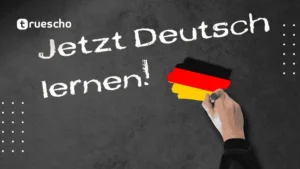German Slang Phrases: 10 Colloquial German Expressions
Table of Contents
Introduction to German Slang Phrases
Traditional language courses and textbooks tend to focus on formal or “standard” German, which often leaves out the dynamic and fun slang that native speakers use on a daily basis. These German slang phrases add color and context to everyday conversations. By integrating these colloquial German expressions into your vocabulary, you will not only understand the language better, but you will also appreciate the culture and humor that come with it.
This article will provide detailed explanations of 10 German slang phrases, including tips on when and how to use them appropriately. Remember: many of these expressions are specific to casual settings, so it is essential to understand the context in which they should be used.
Read also: German University Exams: Ultimate Exam Prep
1. Das ist nicht mein Bier
The phrase “Das ist nicht mein Bier” literally means “This is not my beer.” However, in colloquial usage, it signifies that something is not your problem or concern. When you use this expression, you’re making it explicitly clear that you want to distance yourself from an issue.
- Example: When a friend complains about a trivial problem at work, you might respond with “Das ist nicht mein Bier” to indicate that it isn’t your issue to fix.
Tip: Use this phrase in informal conversations among friends or peers, as it can come off as too blunt in formal contexts.
2. Ich drück dir die Daumen
“Ich drück dir die Daumen” translates literally into “I press my thumbs for you.” This quirky expression is a way of wishing someone good luck. It is comparable to the English gesture of crossing your fingers.
- Usage: You might say this before an exam, a job interview, or any situation where you want to express your support.
If a friend or family member tells you, “Ich drück dir die Daumen”, a simple nod or even returning the gesture with a thumbs-up is often enough acknowledgment. Want to learn more about German cultural gestures? Visit the Goethe-Institut for additional insights into everyday German customs.
3. Na?
Despite its brevity, the expression “Na?” is full of nuance. It is a casual greeting that can be interpreted as “Hey, what’s up?” or “How’s it going?” among friends and close colleagues.
Keep in mind that “Na?” is best reserved for people you have an established, informal relationship with. In a professional context or when greeting someone in a formal setting, it is better to use more conventional greetings.
Pro Tip: Listening carefully to native speakers can help you pick up on the appropriate tone and context for using “Na?”.
Read also: Part-time Jobs in Germany for Students
4. Mach’s gut
There are plenty of ways to say “goodbye” in German. One popular colloquial expression is “Mach’s gut”, which directly translates to “do it well,” but is best understood as “take care.”
- When to use: This phrase is perfect for casual settings, such as conversations with friends or acquaintances.
- Note: Avoid using it in formal environments or in communications with people you do not know well.
5. Ich habe Bock auf …
The phrases “Ich habe Bock auf …” and its negative counterpart “Ich habe kein Bock auf …” are informal ways to express whether you are in the mood for something. When you say “Ich habe Bock auf Pizza”, you’re effectively saying “I feel like having pizza” or “I’m up for pizza.”
- Positive mood: “Ich habe Bock auf einen Film” – I’m in the mood for a movie.
- Negative mood: “Ich habe kein Bock auf Schnitzel” – I don’t feel like having schnitzel.
Tip: Since “Bock” is slang, it should only be used in relaxed, casual conversations. Using it in formal situations may not be appropriate.
6. Geil
One of the most commonly heard words in modern German slang is “Geil.” Historically, this word had a sexual connotation, but in contemporary usage, it is used as an adjective to describe something as “cool,” “awesome,” or “dope.”
- Usage Example: After hearing a new hit song, you might exclaim, “Das ist geil!”
However, be cautious when you use “Geil” outside of casual circles; in formal or sensitive contexts (such as during work or at solemn events), it is best avoided.
7. Feierabend
The term “Feierabend” holds a special place in the hearts of many Germans. More than a way to describe the end of the workday, it encapsulates the joy of being off duty and the anticipation of relaxation.
This expression signifies that it’s time to stop working and enjoy life. In Germany, reaching “Feierabend” has a near-sacred quality, representing evening leisure time after a hard day’s work.
For more insights into the cultural importance of leisure in Germany, consider exploring language and culture articles on Deutsche Welle’s Learn German Page.

8. Ich bin fix und fertig
After a long day, when you simply cannot muster another ounce of energy, you might confess, “Ich bin fix und fertig.” This colloquial phrase translates to “I’m completely exhausted” or “I’m totally wiped out.”
- Usage Tip: Use this phrase with friends and family to explain that you’re in need of rest. It’s a vivid way to communicate tiredness in everyday conversation.
Read also: Commonwealth Distance Learning Scholarships
9. Kein Stress
“Kein Stress” is another popular informal expression used to convey “no worries” or “it’s alright.” When someone uses this phrase, they aim to reduce tension and suggest that everything is manageable.
- Variation: You might also hear similar phrases such as “Kein Ding” or “Kein Thema”, all conveying the meaning that there is no need to worry.
Tip: These expressions are perfect for diffusing stressful situations among friends or colleagues. Their casual nature helps maintain a relaxed atmosphere.
10. Alles hat ein Ende, nur die Wurst hat zwei
Rounding out our list of German slang phrases is the humorous proverb, “Alles hat ein Ende, nur die Wurst hat zwei.” Translated literally, it means “Everything has an end, only the sausage has two.” This witty expression is the German equivalent of “all good things must come to an end.”
- Usage Context: You might say this after a fun party or an enjoyable experience as a light-hearted way to acknowledge that nothing lasts forever.
Note: This phrase captures the playful side of German humor and is best used in informal settings among friends.
Tips for Using German Slang Phrases Effectively
Here are some valuable tips to help you incorporate these colloquial German expressions into your daily conversations:
- Know Your Audience: Always use slang expressions in appropriate settings. Avoid informal phrases in professional or sensitive contexts.
- Practice Active Listening: Listen to native speakers through podcasts, news, or casual conversations to understand the tone and context in which these expressions are used.
- Experiment Gradually: Introduce one or two phrases at a time into your conversations. This will help you build confidence and avoid awkward mistakes.
- Understand the Nuances: Each expression has cultural and contextual subtleties. When in doubt, ask native speakers for clarification or observe how they use these phrases.
- Utilize Authentic Resources: Explore reputable websites like the Goethe-Institut and Deutsche Welle for deeper insights into the language and culture.
Read also: Schwarzman Scholars Programme
Conclusion
Mastering German Slang Phrases and incorporating these essential Colloquial German Expressions into your vocabulary can truly transform your communication skills. From expressing indifference with “Das ist nicht mein Bier” to conveying exhaustion with “Ich bin fix und fertig”, these phrases offer a glimpse into the informal heart of the German language.
Remember, language is not just about words—it’s also about culture. By understanding when and how to use these expressions appropriately, you can connect more authentically with native speakers. Happy learning, and don’t forget to have fun with your German language journey!






